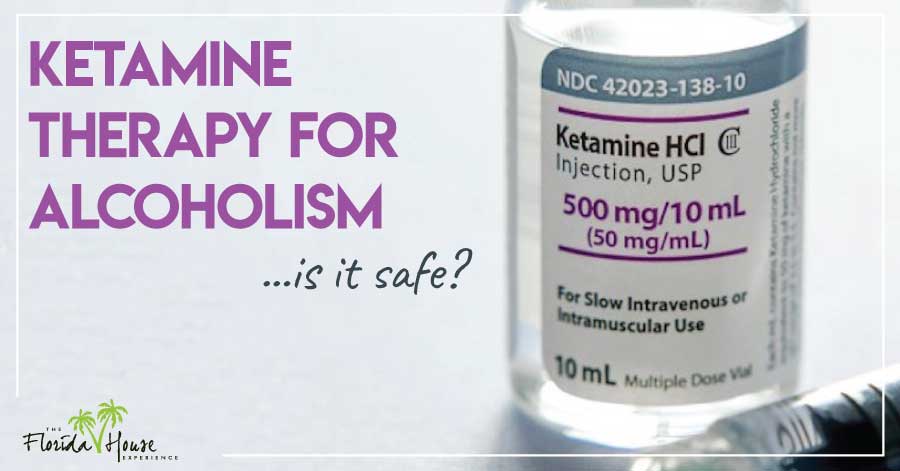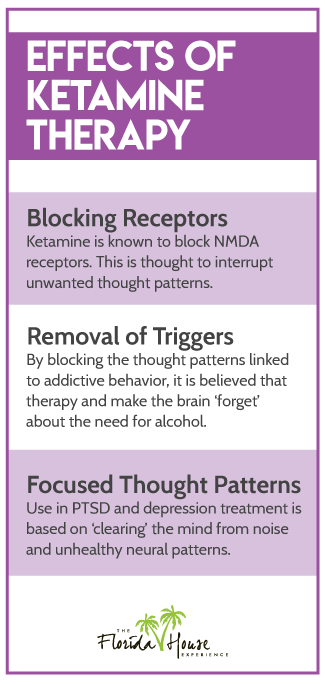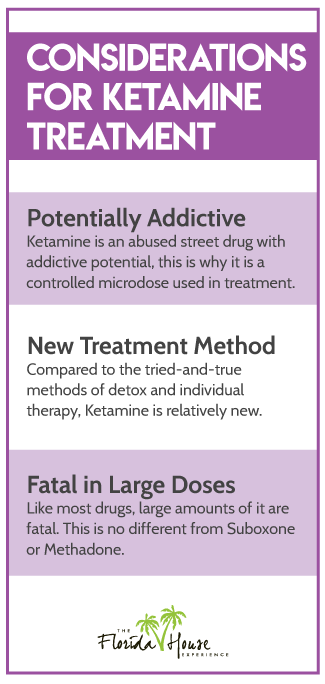
Through the rise and fall of trending drugs, alcohol addiction in Florida continues to be an ongoing issue. While a lot of time and resources are dedicated to the treatment of addiction from opioids and other “hard drugs”, alcohol addiction is a constant and looming threat to the community. Luckily, there are those out there who are dedicated to finding new ways to combat alcohol addiction. One of those ways that might seem unconventional is with the use of Ketamine. Let’s take a look at what exactly Ketamine is and how Ketamine therapy for alcoholism can work.
Alcohol and the Brain
When someone gets addicted to alcohol, the chemical composition of the brain changes. The pleasure receptors acknowledge that the alcohol is good and then wants more of it. The brain essentially programs itself to become dependant on the substance, constantly needing it to function normally. Getting the brain to no longer feel like it needs the alcohol can be incredibly difficult when it comes to the recovery process. So, what can we do to train the brain to forget that it needs alcohol? Well, that’s where Ketamine comes in.
What is Ketamine?
 Ketamine is a medication mainly used for starting and maintaining anesthesia. It induces a trance-like state while providing pain relief, sedation, and memory loss. It is known to block the brain receptor NMDA, which is necessary for the formation of memories. Since each time our brain retrieves a memory, the neural connections that program it are momentarily disrupted, it is believed that giving a person ketamine just as the memory has been disrupted can help to diminish the memory or get rid of it completely. While it’s most common medical use is for sedation and chronic pain, the memory loss effect is what has peaked the interest of those in the addiction industry.
Ketamine is a medication mainly used for starting and maintaining anesthesia. It induces a trance-like state while providing pain relief, sedation, and memory loss. It is known to block the brain receptor NMDA, which is necessary for the formation of memories. Since each time our brain retrieves a memory, the neural connections that program it are momentarily disrupted, it is believed that giving a person ketamine just as the memory has been disrupted can help to diminish the memory or get rid of it completely. While it’s most common medical use is for sedation and chronic pain, the memory loss effect is what has peaked the interest of those in the addiction industry.
How Can Ketamine Therapy Help With Addiction?
While it is not yet a mainstream treatment option, studies have begun to show that Ketamine can also be used to help treat alcohol addiction. The memory loss side effect can actually be used to essentially help make the brain forget that it is addicted to alcohol. Not only that, it is believed that Ketamine can also erase memories and triggers that are associated with drinking. In fact, researchers at the University College of London are testing whether or not ketamine can be effective in changing negative patterns of behavior associated with alcoholism by erasing the memories and triggers that lead to substance abuse and addiction. This is one of the toughest things to overcome when it comes with addiction and is the leading reason for relapse. Finding yourself in a situation or setting that reminds your brain of drinking. This can include seeing a certain person you used to drink with, hearing the clink of glasses, walking by the bar and seeing people outside smoking, or even just simply returning home from work. These can all trigger your brain to want to drink. Ketamine, however, can erase these memories, making it easier to go about your daily life without the temptation of relapse.
Ketamine has also been used to treat many mental health issues from PTSD to anxiety and depression. By taking ketamine we allow our brain to clear out all the noise and unhealthy habits that the brain has developed in time. It allows our brain to focus back on the things in life that matter most, and put aside the harmful noise that has built up in our brain over time.
Are There Any Downsides to Ketamine Therapy?
 Right now there seems to be evidence that this type of treatment may be a successful form of therapy in the future to help the fight against substance abuse dependency. However, there is one possible issue. Ketamine is addictive in nature. This, obviously, can be a major problem for someone that is using it to curtail an addiction since those suffering from alcohol addiction or illicit drug addiction are prone to addictive behaviors. Because of this, ketamine will have to be administered in a medical setting and strictly monitored. That being said, when ketamine is used in addiction treatment, the doctors only administer a microdose. A microdose is such a small amount of ketamine that it is unlikely to cause an addiction and is not enough to create dependency.
Right now there seems to be evidence that this type of treatment may be a successful form of therapy in the future to help the fight against substance abuse dependency. However, there is one possible issue. Ketamine is addictive in nature. This, obviously, can be a major problem for someone that is using it to curtail an addiction since those suffering from alcohol addiction or illicit drug addiction are prone to addictive behaviors. Because of this, ketamine will have to be administered in a medical setting and strictly monitored. That being said, when ketamine is used in addiction treatment, the doctors only administer a microdose. A microdose is such a small amount of ketamine that it is unlikely to cause an addiction and is not enough to create dependency.
Another downside to ketamine is that it can be fatal in large doses. When taken on the street, people can overdose and die from too much ketamine. That is why it is so important to allow a licensed doctor to administer the doses and provide a safe place to allow the treatment to take place. When taken under the supervision of a medical professional, there is no chance of a harmful overdose.
Can Ketamine Work for My Alcohol Addiction in Florida?
While Ketamine is still in the trial stage when it comes to alcohol addiction treatment, there are still many other ways that you can fight your addiction. The first step is to not only acknowledge that you have a problem but to do something about it. Believe it or not, this can be the most difficult step in the recovery process. Nobody wants to admit they have a problem. We, as a society, are prideful people. We don’t like admitting mistakes and we don’t like admitting that we are wrong. So, of course, we don’t want to admit that we have a problem when it comes to alcohol. For many it’s embarrassing. Well, there is no need to be embarrassed. Having alcohol addiction doesn’t mean there is something “wrong with you”. It’s a disease just like any other. If you had diabetes, would you be embarrassed and not want to seek treatment? No, you wouldn’t. You would go see your doctor and get insulin and get yourself better. Well, alcoholism should be viewed in the same way. You have to face your addiction and realize what thought processes, behaviors, and other areas of your life need to change in order to maintain recovery. Relapse prevention therapy gives the awareness and coping mechanisms for triggers or occurrences that may result in alcohol use again. On top of that, individualized therapy for co-occurring disorders or trauma is usually available for those suffering from alcohol addiction within the state of Florida.
Perhaps you are someone who has been to addiction treatment before and it did not work for you. Perhaps you have been several times and even though it helps you stay sober for a little while, it has not helped you maintain a long-term recovery. If that is the case, then ketamine treatment may be the perfect option for you. This form of addiction treatment works very differently from the traditional 12-steps and residential treatment. It works by changing the chemistry of the brain so that it becomes easier to let go of your addiction and see life more clearly. We are here to help answer any questions or calm any concerns you may have regarding ketamine treatment for yourself or a loved one. You can talk to experienced doctors who have seen the benefits first hand and can guide you through the process. We also are able to connect you with patients who have gone through the process themselves and can give you a first-hand experience of what it was like and what to expect.
Are You Interested in Ketamine Therapy for Alcoholism?
While Ketamine therapy is still being experimented with, there are many tried and true options for those who are looking to seek treatment for alcohol abuse. If you, or someone you know, is in need of treatment for alcohol abuse, it is crucial to get help as quickly as possible, before it is too late. At FHE Health, our staff will guide you to a life free from alcohol addiction through therapy specific to you. Call us today at 833-596-3502 to learn more.






